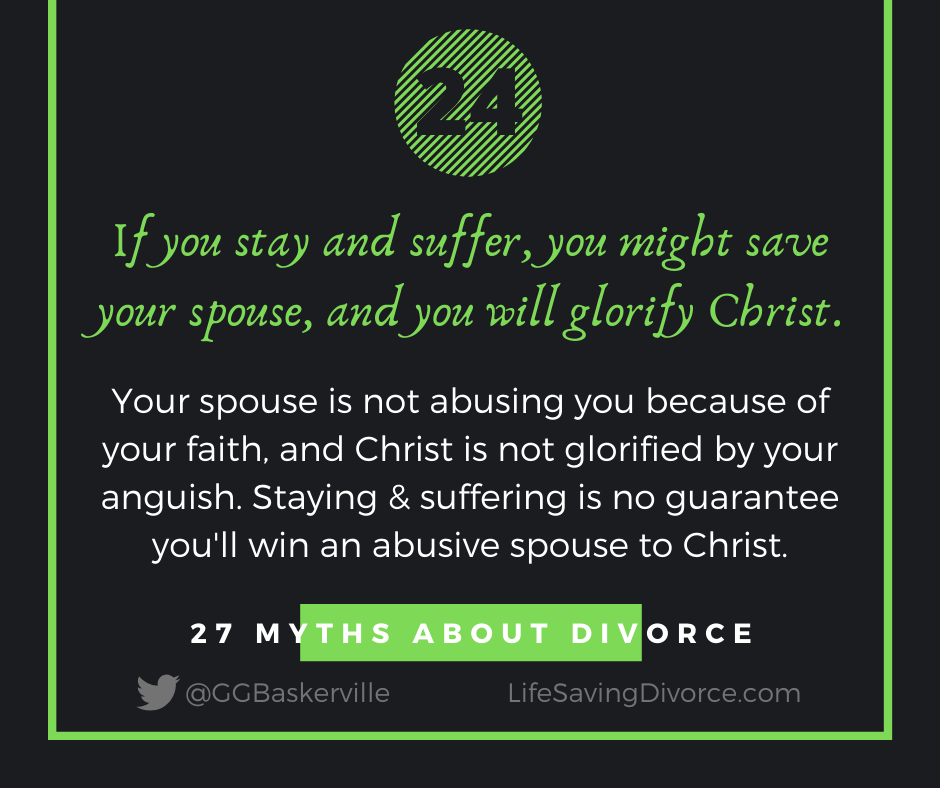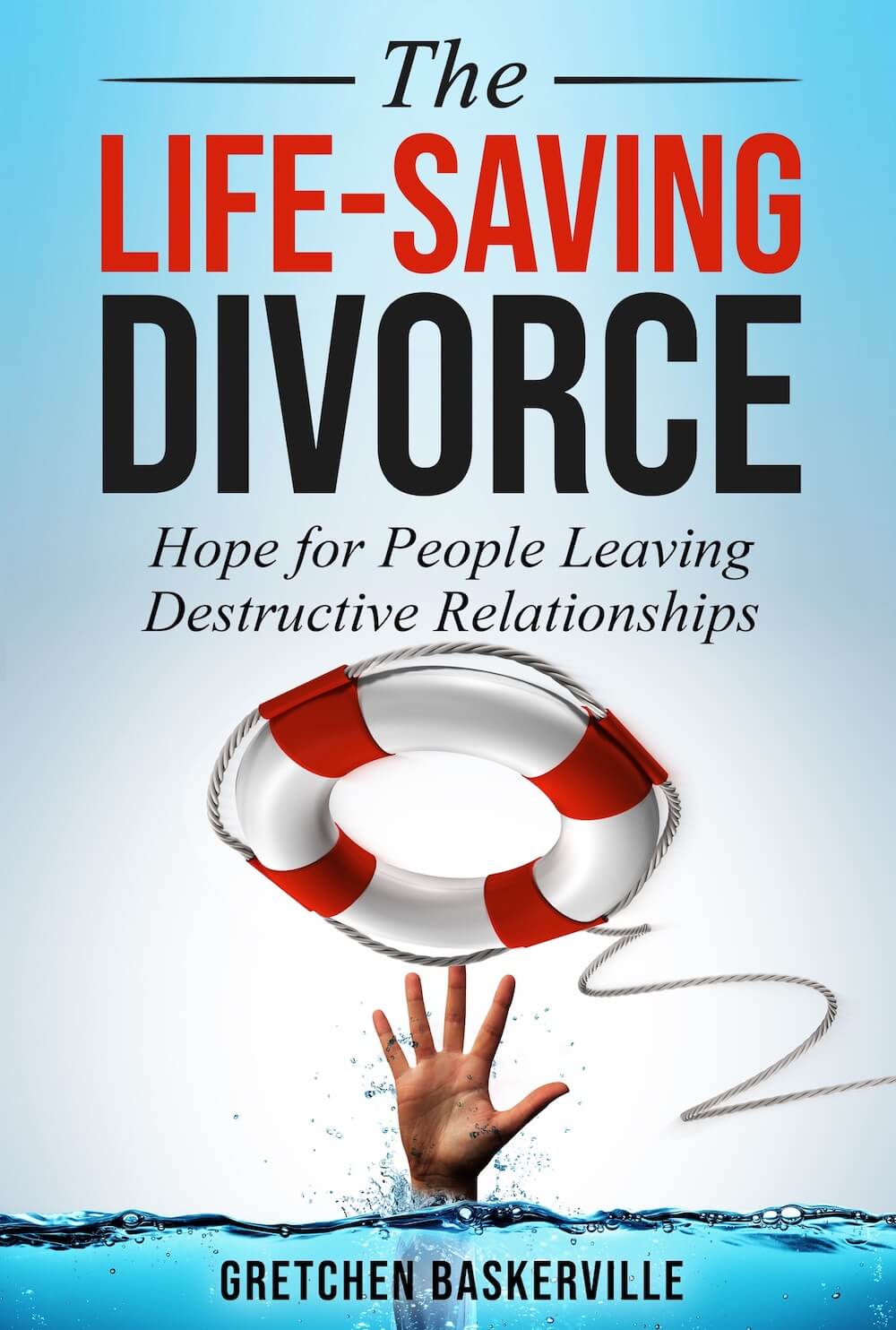MYTH: If you stay and suffer, you might save your spouse, and you will glorify Christ.
TRUTH : Your spouse is not abusing you because of your faith, and Christ is not glorified by your anguish or by the danger you or your children are facing. Staying and suffering does not guarantee you will win an abusive spouse to Christ.
Your spouse is not abusing you because of your faith, and Christ is not glorified by your anguish. Staying and suffering is no guarantee that you’ll win an abusive spouse to Christ. Christians are familiar with the biblical concept of redemptive suffering and of suffering persecution for Christ’s sake. Christians may believe they “are to suffer grief for a little while” on the basis of 1 Peter 1:6.
This verse, combined with verses like 1 Peter 3:1-2 or James 1:2-5 about enduring hardships and becoming godlier, are misused to imply that believers should stay in abusive relationships. Some people say believers should suffer like Jesus suffered on the cross. They were to “count it all joy when they encounter various trials.”
We know this idea by heart, and we want to model our lives after Jesus, who himself suffered for our sake, to reconcile us to God.
But this myth takes this beautiful idea and misapplies it to people who are suffering needlessly in dangerous marriages.
Similarly, many devoted Christians feel it is their duty or calling to convert their abusive spouse to Christianity, and they believe they can do this by staying and submitting to abuse over and over.
In the face of this powerful myth, we must recognize a few truths. First, a spouse who is abusing, extorting, threatening, or terrorizing you and/or your children is not persecuting you because you are a Christian (which is what those Bible verses are talking about).
They would behave this way with anyone who has less power than them, regardless of that person’s faith. Their behavior is not triggered by your belief in Jesus but by their own poor emotional regulation, bad coping skills, dangerous habits, past trauma, or any variety of things that drive abusive patterns in their life.
This is why this myth is a misapplication of verses like 1 Peter 1:6.
Back in the first century, there was persecution of Christians, and their lives were in danger from the governmental and religious authorities (both Roman and Jewish). Christians were being hunted down and killed. “Hardships and suffering,” in this context, was political persecution-not spousal abuse.
Many New Testament writers (like Peter, Paul, and James) tried to bring comfort to Christians who were being persecuted by telling them it would all turn out for the glory and honor of Jesus Christ. Peter told people they would be persecuted and there would be a good outcome: genuine faith worth more than gold.
In this world, there is certainly suffering that is unavoidable. But the Bible doesn’t call us to tolerate violence when it can be avoided, or to suffer when we could use our God-given gift of self-preservation and exit. As Justin and Lindsey Holcomb say: “We are not called to passively accept every form of pain that comes our way.”[1]
Sufferings that we cannot control (cancer, natural disasters, birth defects, illness, etc.) do teach us patience and faith. But there’s nothing virtuous about violence or subjecting yourself to injury when you can avoid it. There is nothing especially holy about suffering when you do not need to. Enduring, rather than getting to safety, endangers you and your children.
Jesus doesn’t want you to be beaten by your spouse to bring him glory.
As one Twitter user says: “It’s so easy to find [Bible] verses about persecution and suffering and make them fit your situation. I recommend reading verses about evil and what the Bible says we are to do in the face of it.”
And what does the Bible say?
The Bible contains many examples of great people of faith who avoided suffering and violence and sought safety:
- Noah and his family avoided the flood (Genesis 6:9-22)
- Abigail defied Nabal and saved her family (1 Samuel 25)
- Rahab escaped the destruction of her city by allying herself with he Israelite spies (Joshua 2)
- Paul used his Roman citizenship as a way of avoiding being killed by a mob (Acts 22:22-29)
- Paul fled the city when he learned of a plot to kill him (Acts 9:24- 25)
- Jesus himself eluded the Pharisees who tried to kill him (Matthew 12:13-15)
- David fled two times from King Saul, who threw a spear at him (1 Samuel 18:10-11)
We don’t get spiritual points for suffering when we can avoid it.
God told people to leave dangerous situations, in the cases of Noah, Abraham, Isaac, and Jacob. He did not miraculously fix their circumstances. He told them to act, and to get out of harm’s way. Jesus rejected Satan’s recommendation that he throw himself from the highest point of the Temple as a way of proving his confidence in God’s promises. Jesus said that was “tempting the Lord your God.”
God has made us with an inborn instinct for self-preservation, and he wants us to listen to it!
Furthermore, staying in a marriage with someone abusive is very unlikely to convert them to Christianity. The Bible itself says in 1 Corinthians 7:16 that you cannot know if you will save your unbelieving spouse. A person comes to accept Jesus by the power of the Holy Spirit.
And for many believers, their abusive spouse is a regular churchgoing Christian, perhaps even a leader in their church. In fact, many Christian men who turn to abuse do so using extreme, twisted Bible verses as rationale for their terrible behavior. They use the name of God to justify their wielding of power over vulnerable people in their care. Such behavior betrays the way they are using this belief system as a weapon for their own gain.
“Biblical patriarchy,” or the teaching that men are designed by God to have all the power and control over women, is just another symptom of the fallenness of humanity. It is not God’s original design. (You can read more about the problems of so-called “biblical” patriarchy in Chapter 2.)
But whether your spouse claims to be a Christian or not makes little difference. Even if they are unsaved, you can be a good spouse, but the Bible makes no guarantees about your spouse’s salvation. In fact, the Apostle Paul says if that person abandons you (no longer providing material goods, shelter and love mentioned in Exodus 21:10-11), let them go.
The apostle Paul also says,
“How do you know, wife, whether you will save your husband? Or, how do you know, husband, whether you will save your wife?” (1 Corinthians 7:16, NIV).
One woman shared this story:
As a kid, I believed God heard my prayers, and God would never put someone bad into my life, but if I allowed a troubled person to enter into my life, then I’m supposed to save him. So I met my husband, dated six months… He was not a Christian, but I could change that!
Now looking back at twenty-five years of serial infidelity and physical abuse, I had thought my husband and I were brought together so I could save him… and make him a Christian, but God’s plan was totally different.
Additionally, it’s illogical to compare a woman or a man enduring their abusive spouse to Jesus carrying the sins of the world on the cross and taking the punishment for all time and eternity. Jesus died to take away the penalty of sin and redeem humanity.
A woman cannot take away the penalty of her husband’s sin, and vice versa.
Her suffering doesn’t redeem his sin.
He alone bears his own responsibility for his sin.
It is tempting to imagine a future in which your silent suffering of abuse transforms your spouse’s heart from the inside out, makes them see their bad behavior, repent, and change. This is promoted by Christian romance novels where the heroine quietly sets a good example, thus winning over a “bad boy.” But in the Bible, Christians are called to remove abusive people from the church (1 Corinthians 5:11). In fact, never experiencing consequences for abusive behavior usually has the opposite effect: it keeps the abuse going.
“Your kindness to the wicked does not make them do good. Although others do right, the wicked keep doing wrong and take no notice of the LORD’s majesty.” -Isaiah 26:10
After all, why should the dangerous spouse feel motivated to make any changes? They have learned they can act out in horrible ways, and they still get to stay married to someone who keeps the household running, takes care of the kids, supports their career, picks up all of their slack, and helps keep their reputation squeaky clean in their community.
They are getting all the benefits of a committed, mutual partnership with less of the responsibilities and effort required. Their best chance of seeing their bad behavior, repenting, and changing isn’t to have you keep putting up with abuse, absorbing the devastation, and never protesting or taking a stand.
No, their best chance is to get a loud, firm wake-up call: If you keep doing this, you will lose your marriage, your family, your social standing, and the respect of your community.
That behavior is unacceptable, and if they want to keep what they have, they need to make major changes and take responsibility for their actions, just like all the rest of us.
One pastor rejects the myth that you should just endure:
Abusive marriages are not healthy.“As a young pastor I would hear stories of women being told, ‘Your black eye is your cross to bear. I wish that hadn’t happened to you, but you are not free to leave your relationship because God is trying to soften your husband’s heart with your faith.’ I was [thinking]: That’s sociopathic. This is a disease.
“Listening to their stories, I knew these women were more precious than anyone’s theology or ideas about marriage. To the living God, people are infinitely more valuable than principles. In Greek, the term ‘sound doctrine’ means ‘healthy doctrine.’ If your doctrine is healthy, then the people living by it will be healthy, too.”[2] -Pastor Steve Daugherty
And they don’t glorify God.
Footnotes:
1 Justin Holcomb and Lindsay Holcomb, “Does the Bible Say Women Should Suffer Abuse and Violence?” JBC 28, no. 2 (2014), accessed 12/13/19, http://justinholcomb.com/wp-content/uploads/2014/09/Does-the-Bible-Say-Women-Should-Suffer-Abuse-and-Violence-Holcomb.pdf Justin is a frequent contributor to The Gospel Coalition blog.
2 Interview with Steve Daugherty, teaching pastor at Crosspoint, Cary, NC, author of Experiments
in Honesty. Host of the podcast “Noises from the Attic.”
Popular posts:What’s a Life-Saving Divorce? Where can I find the book?
One Woman’s Story: Adultery, Prayer, and the Bible
27 Myths of Divorce that Aren’t True for Committed Christians
The Bible Doesn’t Say “God hates Divorce”-it’s not in the Hebrew text
Bible verses that condone divorce for serious reasons.
“He Never Hit Me”: Interview with a woman whose husband emotionally abused and neglected her
10 Turning Points: What is the “Last Straw” for Most Devout Christians. See One, Two, Three.
Children and Divorce: Why life-saving divorce is very good for children
For an entire chapter giving example of types of abuse (physical, emotional, sexual, financial, and neglect) and explaining the term “gaslighting,” along with many first-person stories, read Chapter 4 in the Life-Saving Divorce. As an Amazon Associate I earn from qualifying purchases.
For more on these 27 myths, read Chapter 3 in The Life-Saving Divorce. To see all 27 myths on one page click HERE
For a definition of life-saving divorces, read What is a Life-Saving Divorce?
For a chapter on all the passages in the Bible on divorce, see Chapter 6. God allows life-saving divorces.

For more on the myths of divorce, buy the Life-Saving Divorce.
As an Amazon Associate I earn from qualifying purchases.



 :
:
 Buy PDF
Buy PDF